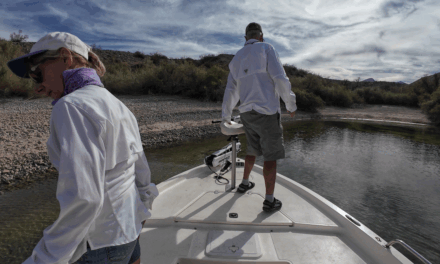AUSTIN, Texas – Active golden alga blooms are causing fish kills in nearly a dozen water bodies in north-central Texas, according to the Texas Parks and Wildlife Department.
Most of the fish kills are relatively small and involve shad, an abundant forage fish, but some game fish species are also being lost, say investigators with TPWD’s Kills and Spills Team.
“We’re seeing more ongoing activity,” said David Sager, Ecosystem/Habitat Assessment branch chief at TPWD. “We’re monitoring and taking water samples, studying the water chemistry and a lot of other parameters of the lakes during the blooms to see if there’s anything we can attribute to the cause.”
TPWD is currently monitoring golden alga activity on Lake Whitney, where cell counts had been rising during the last two weeks and a fish kill occurred on Sunday, Jan. 30 in the upper end of the lake.
“Unfortunately, it is happening, but we expected it because cell counts (the density of the alga) were going up and the water was turning yellow and foamy,” said Joan Glass, a Kills and Spills Team investigator.
Golden alga activity has been ongoing along the Brazos River watershed for several weeks, impacting fisheries at Possum Kingdom Reservoir and Lake Granbury. Because of recent rainfall, dams at both impoundments have been releasing water, which Glass said may be contributing to activity at Lake Whitney.
TPWD is also monitoring for golden alga on the following: Lake Kemp, Lake Diversion, Lake Sweetwater, Lake Colorado City, Moss Creek Lake, Wadley-Barron Park pond in Midland and Red Bluff Reservoir in New Mexico. E. V. Spence Reservoir is not experiencing a kill and the Colorado River between Spence and O.H. Ivie Reservoir is stable. There have been no reports of any dead or stressed fishes in O.H. Ivie Reservoir.
Biologists at the Dundee State Fish Hatchery in Wichita Falls are also experiencing golden alga in several hatchery ponds and are experimenting with various techniques to control the alga. “They’re looking at various treatment options including barley straw in containers to see if it helps control the toxins,” said Sager. “Straw has been used to control algae in other lakes and areas, but it’s never been tried on golden alga.”
While golden alga is present on several lakes, biologists say the good news is that the blooms have not returned to Lake Texoma. Texas and Oklahoma fisheries biologists have not found any high concentrations of the toxin producing alga in samples taken throughout the lake.
Glass also reported that golden alga activity on Lake Granbury appears to be subsiding. “We’re not losing any more fish and a fishing tournament was held there over the weekend and they were catching fish so that’s a good sign,” she noted.
The ongoing algal blooms also are providing researchers with an active event to study, according to Sager. “We’ve begun an intensive monitoring program at Lake Whitney and will be taking samples of all the different plankton communities. We’ll share that information with the universities so they can use it in conjunction with their research.”
Scientists from several universities in Texas are working in laboratories and with net enclosures at Possum Kingdom Reservoir studying the affects of water quality on algal bloom toxicity. Researchers are also looking at algae genetics. Another study is focusing on the economic impacts of fish kills; specifically at the 2001 golden alga fish kill events at Possum Kingdom Reservoir.
“We’re also working in cooperation with river authorities and local governments to obtain water samples from around the state to see where golden alga might be present,” added Sager. “That could be helpful if we find it in locations that aren’t experiencing kills. We could try to identify what controls are present at those sites that aren’t present at sites experiencing fish kills.”
First discovered in Texas in 1985, golden alga (Prymnesium parvum) was identified in a fish kill in the Pecos River and has since been responsible for fish kills in the Colorado, Canadian, Wichita, Red and Brazos river systems as well.
This alga releases a toxin that kills gill-breathing organisms such as fish and clams. According to the Texas Department of State Health Services, anecdotal evidence has shown no human health risks associated with golden alga.
Since 2001, golden alga fish kills have occurred on two dozen reservoirs in Texas. Since 1985, nearly 18 million fish have been killed, most of which were either forage or rough fish species. – Lake Mohave
– Lake Mohave






